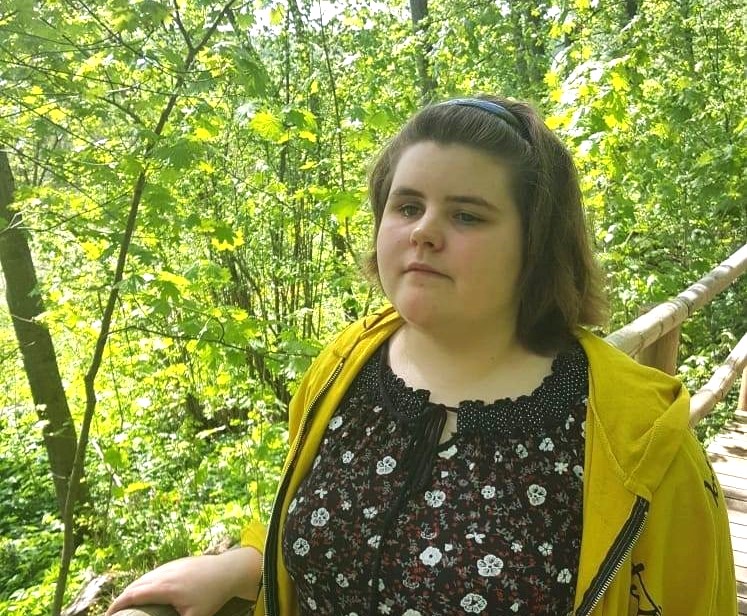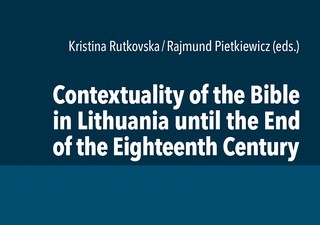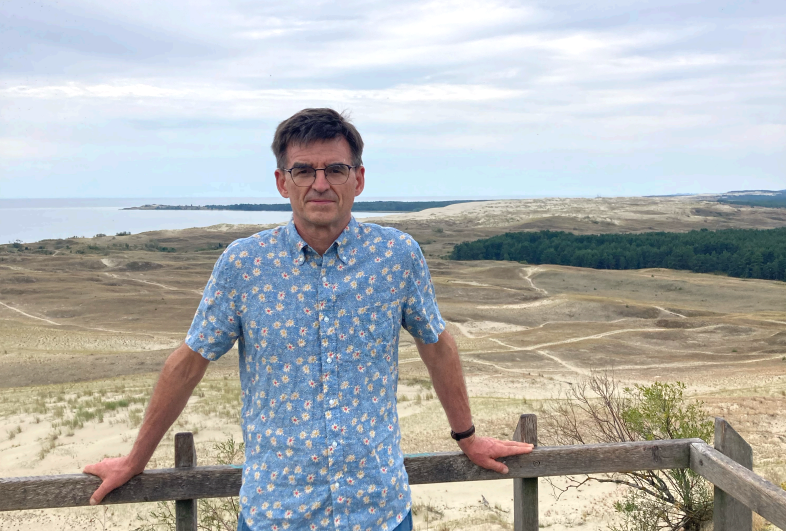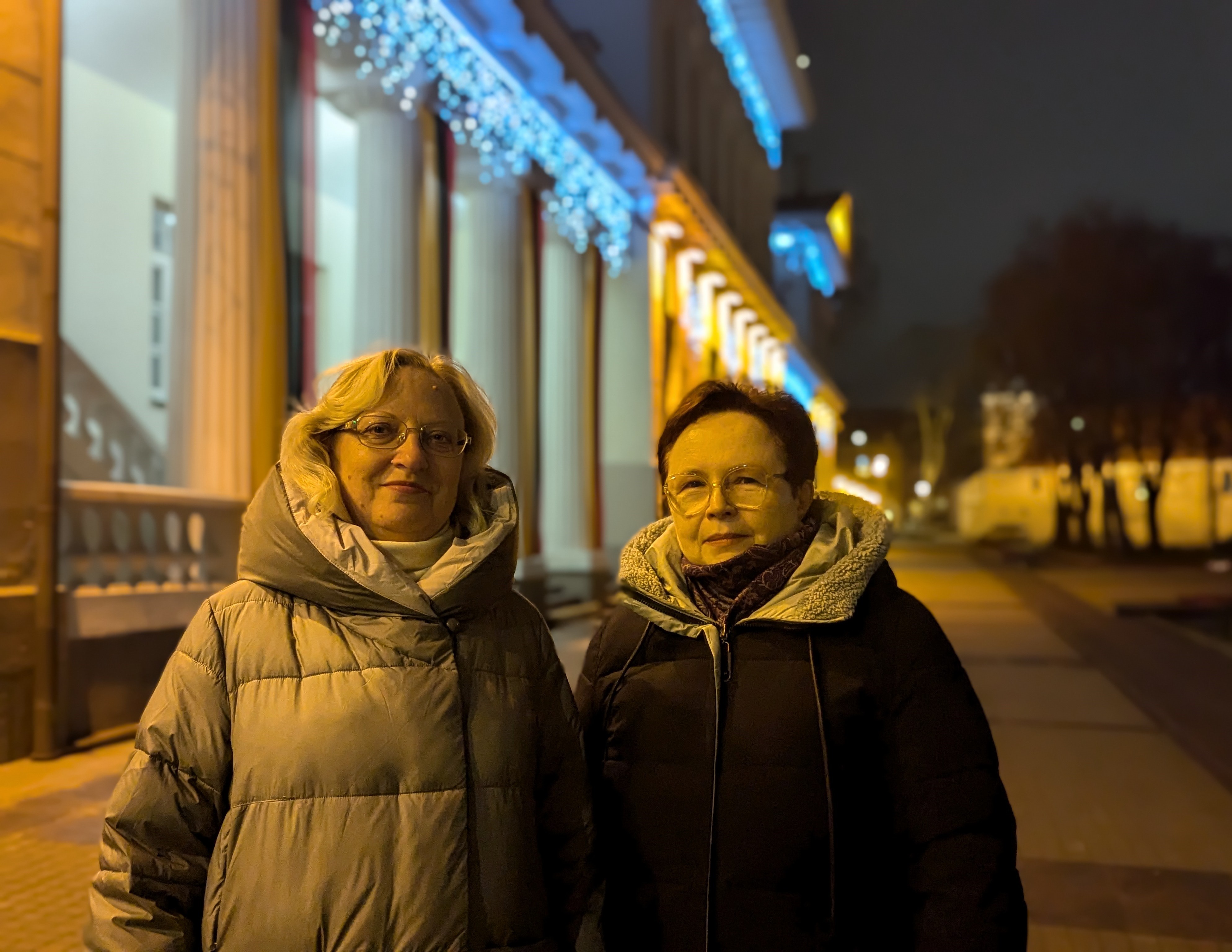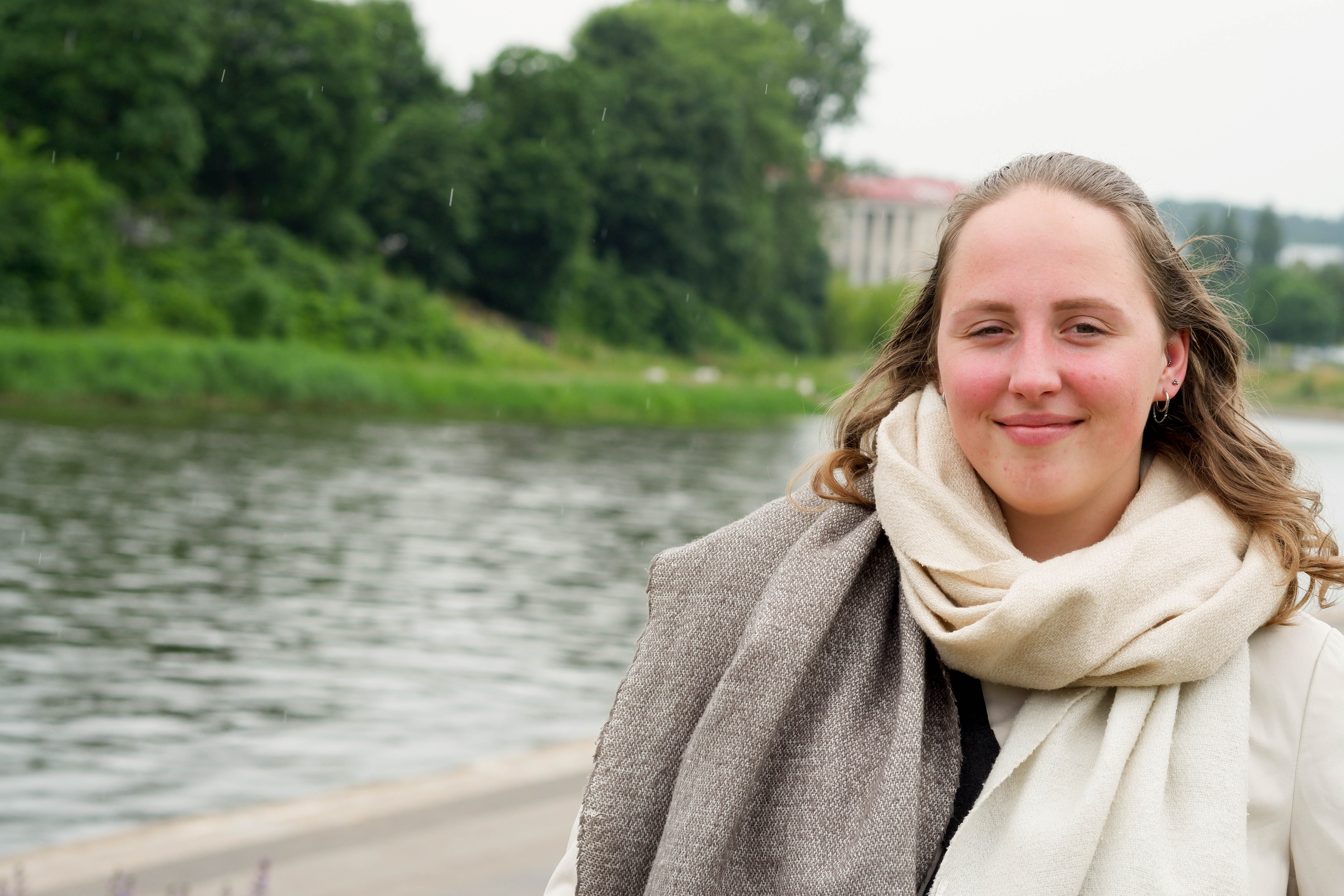
Photo by Veslava Sidaravičienė
Elīza Paula Graudiņa, a Master’s student in Intermedial Studies of Literature at Vilnius University, speaks fluent Lithuanian – a language she admits she never expected would become such an important part of her life. ‘While choosing my studies, I didn’t even think about Lithuanian; at first, I didn’t like how it sounded. In fact, I actually planned to study Latvian language and culture,’ recalled Elīza.
However, her plans changed after a fateful meeting with Edmunds Trumpa, Head of the Centre for Lithuanian Studies at the University of Latvia, and a summer language course in Lithuania. Now, Elīza is pursuing her studies in Vilnius and starting to work on her Master’s thesis on the adaptation of the comic book ‘Sibiro haiku’ (‘Siberian Haiku’) by Jurga Vilė and Lina Itagaki for Lithuanian and Latvian theatre.
Starting studies at the University of Latvia
Elīza Paula Graudiņa started learning Lithuanian during her Bachelor studies in Baltic Philology at the University of Latvia. ‘During the first year, Lithuanian language seminars are compulsory for all students, but later, you can choose whether to continue. That is when I decided to deepen my knowledge of Lithuanian further,’ said the student.
To improve her skills, Elīza attended a Lithuanian language summer course organised by Vytautas Magnus University, yet studying remotely became a real challenge. ‘It wasn’t easy spending the entire summer studying on the computer, but it helped me stay in touch with the Lithuanian language and learn new things,’ she noted.
Later, Elīza attended a Lithuanian language summer course at Vilnius University. At first, she was intimidated because she was placed in a higher-level group despite feeling that her language skills were still rather limited. ‘I thought I could only manage the few sentences that I had learnt for my university exam. But the course made me realise I could do so much more,’ said the student.
Her turning point came one evening when she was visiting Lithuanian friends. ‘A few of them could speak Latvian, but most of the guests only spoke Lithuanian. So, I had no choice but to try to communicate with them. That’s when I realised that I could actually speak Lithuanian,’ recalled Elīza.
The student’s love for Lithuanian deepened through translation workshops led by Assoc. Prof. Edmunds Trumpa. ‘Various Lithuanian poets and writers, like Vladas Braziūnas and Rimantas Kmita, visited Riga for these workshops, where students work on translations together with the authors and read the translated parts aloud. As I prefer preparing translations in advance, I usually worked at home and then discussed them with the authors later. A professional translator was also invited to assist with any challenging questions,’ said Elīza, who admits that she would like to work on more fiction translations in the future.
Her engagement with Lithuanian summer courses extended beyond learning – she also started teaching. ‘Last summer, I participated in a summer course organised by the Institute of Lithuanian Literature and Folklore. Before starting my studies, I wanted to reinforce my grammar knowledge and review everything I already knew. But in the winter, the organisers from the Institute invited me back, not just as a student but also as a teacher,’ said Elīza.
She has been teaching literature reading classes with a PhD student from the Institute. This year, Elīza is taking on the task independently, although she admits she still feels a bit nervous: ‘I’m most worried about questions related to word stress.’
Although teaching has never been in her plans, this experience opened up new opportunities. ‘I never thought I’d become a lecturer, but now teaching Lithuanian seems much more interesting to me than teaching Latvian,’ she admitted.
‘I chose topics related to the Lithuanian language for both my Bachelor’s and Master’s theses’
Elīza Paula Graudiņa dedicated her Bachelor’s thesis to the analysis of Lithuanian literature translations into Latvian in the period from 2008 to 2022. ‘The first part focuses on translations of various genres of Lithuanian literature, while the second one compares the reception of five authors’ works in Latvia and Lithuania,’ she explained.
For her analysis, Elīza chose ‘Sibiro haiku’ (‘Siberian Haiku’) by Jurga Vilė and Lina Itagaki, ‘Silva Rerum’ by Kristina Sabaliauskaitė, ‘Mano vardas – Marytė’ (‘My Name is Marytė’) by Alvydas Šlepikas, ‘Kraujas mėlynas’ (‘Blue Blood’) by Undinė Radzevičiūtė, and ‘Vilko valanda’ (‘The Hour of the Wolf’) by Andrius Tapinas. Her selection was influenced by the awards and popularity of these books.
‘During my research, I found more similarities than differences, with the exceptions primarily relating to the reception of historical novels. In Lithuania, for instance, there is a debate over whether ‘Silva Rerum’ is popular or literary fiction. In Latvia, there is no such question, as popular literature is just regarded under the umbrella of fiction,’ noted the student.
She also observed that Lithuanians pay more attention to the accuracy of historical details, while in Latvia, they are not seen as crucial. ‘It’s not our history, so we tend to read the works as fiction,’ she said.
Her analysis of the reception of ‘Sibiro haiku’ also uncovered some intriguing differences: ‘One Lithuanian reviewer criticised the comic format, claiming that it was adopted from other cultures and unsuitable for such painful historical memories. Meanwhile, in Latvia, the comic book format was well received, and there was no such controversy.’
For her Master’s thesis, Elīza plans to continue her research on ‘Sibiro haiku’, focusing on its theatrical adaptations. ‘I’m currently planning to write my thesis on the theatrical productions of ‘Sibiro haiku’ in Lithuania and Latvia and analyse them through the lens of intermediality. I’m interested in how a graphic novel turns into a script, how the narrative shifts from visual to textual, and how this text ultimately transforms into a performance,’ said Elīza.
Currently, both performances are being staged in Lithuanian and Latvian theatres, and Elīza plans to analyse their recordings. ‘Accessing Latvian recordings is more challenging because the performances have just started. However, the organisers promised to send a recording, at least for a short time, so that my supervisor could access the material.’
In her free time, Elīza sings in the Vilnius University choir ‘Gaudeamus’. ‘I decided to join the choir as soon as I arrived – it was a kind of social experiment. Performing in Liepāja was especially rewarding because I could perfectly understand both Lithuanians and Latvians. One Latvian woman even asked me if I could speak Latvian. It was very funny because I’m Latvian myself! But, of course, it was nice,’ she laughed.
As for the future, Elīza is still exploring her options. ‘I’m considering graduate traineeships as an opportunity to go abroad after my studies and teach Lithuanian. Who knows, maybe I’ll end up teaching Lithuanian in Uruguay,’ she smiled.
On the other hand, Elīza is also drawn to the academic path: ‘In Latvia, I work as an assistant at the Institute of Literature, Folklore and Art. I could continue my research and pursue a PhD, potentially even in Lithuania.’
The Department of Baltic Studies at the VU Faculty of Philology continues its series of articles featuring alumni from foreign centres of Baltic studies. After graduation, they not only continue to deepen their knowledge of Lithuanian but also integrate the Lithuanian language, literature, and culture into their professional activities.
This article is part of the project ‘Information and Coordination Portal of Baltic Studies Centres’ (No. 1.78 Mr SU-1006) implemented by the Department of Baltic Studies at the VU Institute for the Languages and Cultures of the Baltic and supported by the Ministry of Education, Science and Sport of the Republic of Lithuania.
Prepared by Dr Veslava Sidaravičienė, Research Assistant at the Department of Baltic Studies of the Institute for the Languages and Cultures of the Baltic of Vilnius University.


